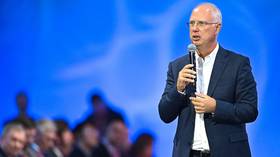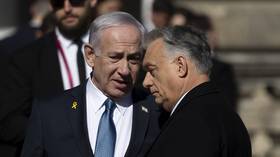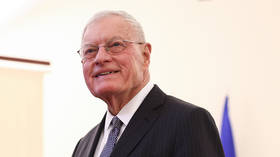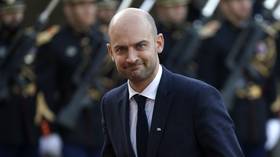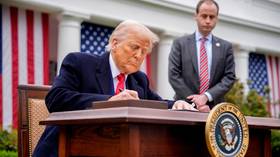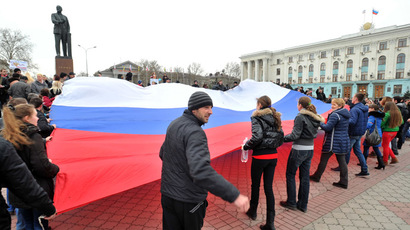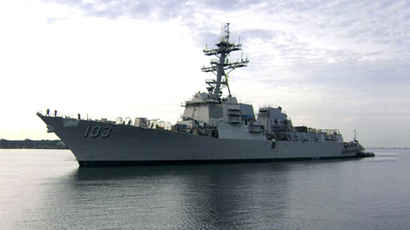Crimea won’t work with ‘illegitimate’ Kiev govt – PM Aksyonov
The upcoming referendum is Crimea’s own decision to distance itself from Kiev’s coup-appointed, illegitimate government, Crimea’s PM Sergey Aksyonov told RT. The Crimeans don’t want a group of “radicals” to impose their will on the autonomous region.
Crimea’s population will vote in a referendum on March 16 to
decide whether to join with Russia or remain an autonomous
region. Prime Minister Aksyonov told RT that Crimea rejects the
intimidation of the coup-appointed government in Kiev and is
holding the referendum because ethnic Russians in Ukraine don’t
want to be treated like “second-class citizens.”
Dismissing Western reports of a Russian invasion as “flagrant
lies,” Aksyonov explained there is no threat to life or the
security of Crimea.
RT:Today, the Crimean parliament voted in favor of joining Russia. Would you comment on this decision and its reasoning?
SA: Crimeans have repeatedly told us to hold a referendum on joining Russia and on the status of Crimea’s autonomy. And of course we’ve been guided by the interests of our electorate. In various regions of the Crimea, the members of our parliament hold regular meetings with the voters, who have frequently asked to make the ultimate decision given the current situation in Ukraine: either to seek full autonomy, meaning an ability to adopt our own state laws; or to opt for secession, since the situation in Kiev has been spinning out of control.
The central government is run by radicals that the opposition actually fears. The so-called Maidan rapidly degenerated from an initially peaceful protest movement in early December into a radical structure involving militants from Western Ukraine who preach a clearly Nazi ideology. Government appointments are being made under the influence of the Maidan, with ministerial offices handed out to those who hurled the most stones and firebombs at the police. This is a dead-end strategy.
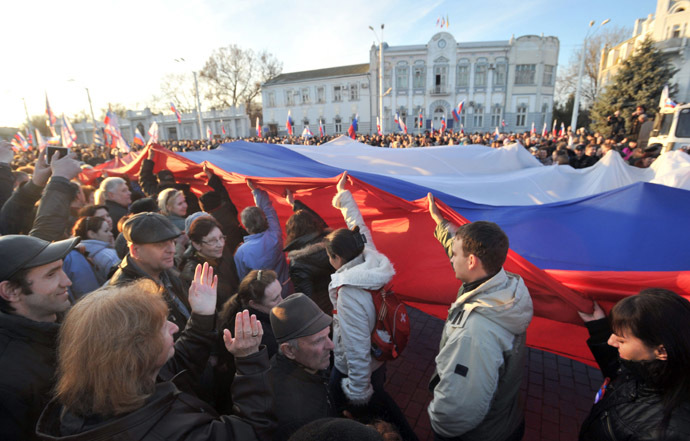
In the same fashion, they legitimized Dmitry Yarosh from the Right Sector by making him Deputy Interior Minister. So it’s no wonder the police and the internal troops are saying, "How do we obey someone who gave orders to kill the policemen?" It is truly outrageous that there were casualties on both sides. But the killing of law enforcement officers, who are supposed to defend the people, is twice as radical and outrageous. That's why today Crimeans are brimming with anger and pushing us and the MPs into making a decision and providing sound security for all Crimeans.
RT:Do you think the timing is right for such a decision, considering how explosive the situation is at the moment?
SA: The situation in Crimea is not explosive.
RT:I’m referring to Ukraine in general.
SA: Ukraine's security services and Interior Ministry are actually defunct. My friends call me from Kiev every other day, saying their movement is hampered by masked gunmen, who have no IDs, who search their cars, ask them stupid questions about the origin of the cars and about how much money they have and so on - without any legal grounds to do so! Intimidated and demoralized, the police turn a blind eye to the radicals' stunts.
Earlier today my friends told me they're leaving Kiev because the situation is beyond the edge of reason. The opposition fails to control the Maidan because there is no one to do that: all the policemen took off when they saw they're being used to stand against the people. What’s more, there are attempts to bring criminal charges against the police for fulfilling the orders of the then-legitimate government. But what are the Berkut units to blame for? They simply followed orders from their commanders. They had no other choice. And now their obedience is held against them. That's why the police officers do not want to patrol the streets.
Those who guard the military bases refuse to fight back if someone attacks military depots. So to ensure security, stability and public order, we set up self-defense units in Crimea. The well-being of the Crimeans is our top priority.
RT:Has there been any response from Kiev?
SA: You must have seen them yesterday trying to arrest me and Vladimir Konstantinov at Shevchenkovsky Court in Kiev. It's ridiculous to see the same pattern they fought against under the Yanukovich government, when you could see criminal cases fabricated every day, and the law enforcement officers victimized the people. The scenario hasn’t changed at all. Cases are still being fabricated. And yet we haven't seen a single officer of the Ukrainian security service in Crimea.
Before arresting us, they should have thought of arresting the gunmen who took over the Supreme Council and the Council of Ministers. For a whole week all the Crimean buildings were besieged. I kept trying to call the security officials, but they’d vanished into thin air. We were begging them to talk to the gunmen or perhaps storm the buildings – to take some action. It sounds unprecedented to me to have the police and security forces sitting on the fence while some of the government buildings were taken over by armed men. There was zero reaction on their side, no criminal charges brought, nothing!
RT:Have you seen any reaction from Kiev to your parliament’s decision of today? If not, what kind of response do you anticipate?
SA: Not to my knowledge. I think we're going to face a bout of hysteria and a flow of accusations over the reluctance to stay in Ukraine. But we're not trying to slice the country with the Ukrainians, or with any other nation. We just don't want a group of radicals who took power in Ukraine to impose their will on Crimeans.
RT:We’ll get to know the will of the people soon, as the referendum will take place in 10 days. What are the questions on the ballot?
SA: One, do you agree for Crimea to become part of Russia? The second question has to do with the 1992 Constitution. The questions on the ballot are now available on the Supreme Council website. As the Crimeans provide their answers, they will be able to say if they would like to be a standalone autonomous entity or join Russia. I'm almost sure they will vote for the second option.
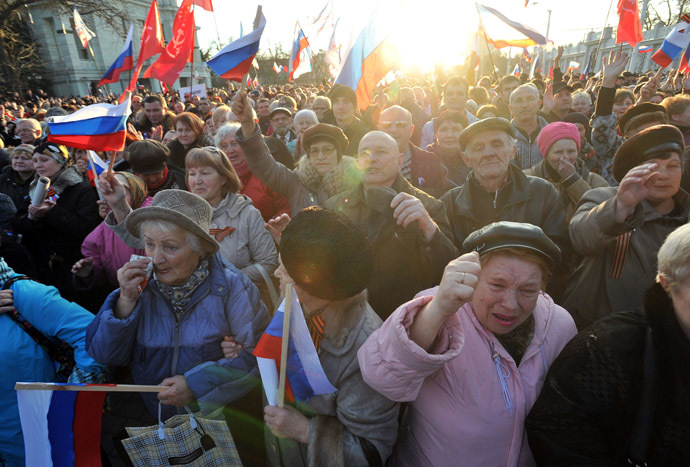
RT:If that is indeed the outcome of the referendum, what will be your practical steps from then on?
SA: We're working on a package of draft proposals. A group of MPs is arriving tomorrow in Moscow to talk to the State Duma MPs. The Russian parliament and president will have to coordinate their actions and say if this accession is legally possible. We are working on ways to speed it up.
RT:Did Crimean MPs consult Moscow before taking the vote today?
SA: No, that was Crimea’s own decision.
RT:How did Moscow respond to it?
SA: Common sense tells me Moscow should say yes to the ideas the Crimeans will voice at the referendum.
RT:You’ve already explained how you feel about the new government in Kiev. Still, do you plan to engage Kiev in any format? Are you keeping in touch with them at present?
SA: Right now I don't have any contacts with Kiev. We do not say we won't cooperate with Kiev: I've got a lot of friends there, who tell me the situation in Kiev is out of control.
RT:No, I mean government-to-government contacts.
SA: We think the current government in Kiev is illegitimate so we won't work with them. If tomorrow a new legitimate government is elected in Ukraine, we will gladly cooperate. Ukrainians are still very welcome at our holiday resorts, as are investors. We are open for dialogue and would like as many people as possible to come here from across the world. So I believe today we've got a very favorable situation for the Crimeans to influence their own life. There’s nothing wrong with that.
RT:Has Ukraine’s new government tried to contact you?
SA: As far as I know, they were trying to send some envoys to Mr. Konstantinov for talks. But there have been no specific proposals as of today. Judging by the latest laws passed in the Verkhovna Rada, they are not ready to talk constructively. A nationalist-led committee, including the notorious Irina Farion, is working on a new law on language which implies eliminating all the Russians in Ukraine - they make no bones about proclaiming this publicly. What else is there to expect from such a government and parliament, except intimidation and occupation? There are simply no other options.
RT:Do you anticipate aggression or provocation from Kiev in response to today’s vote, or to the referendum?
SA: This dishonest government is capable of resorting to any dirty tricks. But I hope we have enough resources to defuse any conflict and to make sure all the instigators get their due in court.
RT:Both President Putin and the Crimean government have stated repeatedly that there are no Russian troops in Crimea, apart from the naval base, which is here legally, under the Treaty of 1997. But we still see media reports claiming that Russian troops are blocking the airports in Simferopol and Sebastopol.
SA: They are blocked by self-defense forces of Sevastopol and Crimea. The Western press is just hyping the tensions around the whole story, trying to show that Russia is using force to make decisions. That’s not true.
RT:But Western reporters have allegedly spotted military vehicles with Russian license plates.
SA: Western reporters spot non-existent things in Crimea, but ignore stuff in Western Ukraine.
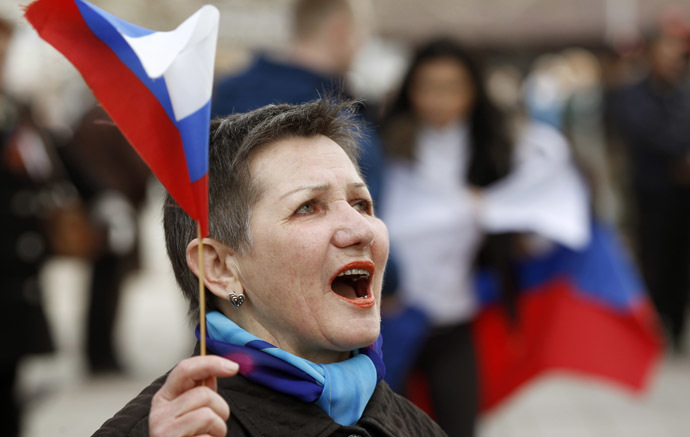
RT:So Russia has no Tiger trucks in Crimea?
SA: There are Tiger trucks of a different origin. I know Crimean businessmen who buy Tiger trucks for hunting. They can afford that.
RT:Who are those armed people, then? They are dubbed, rather vaguely, ‘self-defense forces’. But who are they comprised of?
SA: Most are local volunteers. There are also Russian servicemen, paratroopers, Afghan War veterans – we appreciate their help a lot. Seven hundred Kuban Cossacks recently joined the self-defense units. In other words, there are lots of people willing to support their compatriots. We are immensely thankful to the Russians, the Russian Parliament and President. They all care about the situation in the Crimea. We've even got calls coming from Russian regional governors, who tell us they're ready to offer humanitarian and financial assistance.
RT:Who is in charge of those volunteers?
SA: Me, at the moment.
RT:So people who want to enlist have to apply to you?
SA: They can apply by phone, at our website or at a special office. We put up tents in the streets for people to enlist. As of today we've got over 25 companies of volunteers. They do it all out of patriotism and free of charge.
RT:There are self-defense volunteers who wear civilian clothes and an armband. But there are also guys in standard-issue fatigues, who look alike and carry some serious firearms. And that’s what gets reporters confused as to who those people actually are.
SA: Some two months ago when the whole thing started, we knew we needed to introduce uniforms to recognize our fellow activists. We have 2,000 more camos for the self-defense forces. Chances are there's going to be a Crimean Defense Ministry and Armed Forces. Right now we've got enough resources to provide them with uniforms. Some come to us with their civilian clothing on. Handing out the uniforms is supposed to make it more convenient for the people to fulfill their duties. That was our idea.
RT:So they get their guns from you, then?
SA: Their guns are their own and officially registered. For instance, the Afghan War veterans have 170 registered guns. All we do is track these weapons. It’s entirely legal by Ukrainian standards.
RT:You’ve said the Crimean parliament did not consult Moscow before taking the vote. Does Russia have any influence on Crimean affairs?
SA: The people are so filled with gratitude and patriotic emotions that they want to have very close relations with Russia. Many of them would like to be part of Russia. Everyone feels we are not alone in this. We can see now that Russia will not leave Crimea in times of need. About 85 percent of Crimeans are Russians or Russian-speaking residents. Over 60 percent are ethnic Russians. It was Russia’s duty to help us. If only it had earlier helped Russians in Ukraine to stop being second-class citizens.
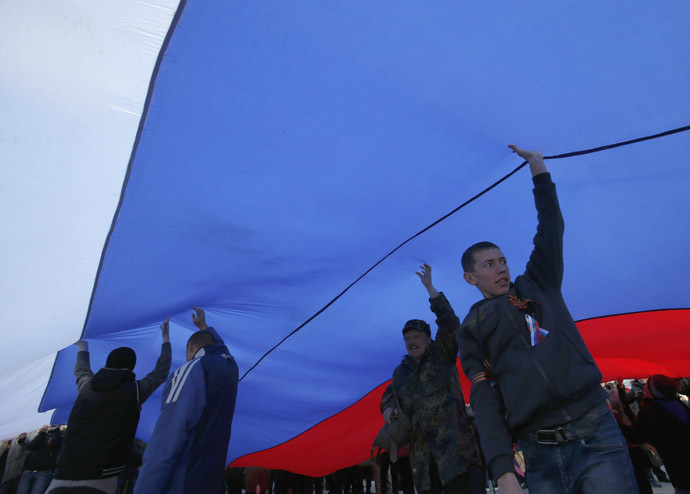
RT:How is your dialogue with Crimean Tatars going?
SA: I’ve been meeting with various groups of the Crimean Tatars and their leaders. Yesterday my deputies met with the Crimean Majlis. We’re sure our dialogue will be peaceful. We are ready to tackle all their staffing and funding issues. Today we agreed on the money they need to arrange decent living conditions for deported Tatars. I promise we won’t cut the funds on these programs. The prospects are bright.
RT:You stated recently that all the military and police in Crimea report to the Crimean government. But we hear about military bases besieged here and there, and see footage of troops standing their ground, like the recent standoff at Belbek air base. Can you confirm that you are in control of all the military and police personnel?
SA: We do control all the police personnel. As to the army, most of it is already on our side. Commanders in some units prevent the troops from leaving the base under threat of bodily harm. I receive personal calls from these besieged bases. The servicemen are asking me to release them, saying the entire base personnel are ready to overthrow their commanders, who are making them obey the new government that gave orders to kill three internal troop servicemen in Crimea. These officers say, “Our commander, who has close ties with Kiev, is intimidating the soldiers and won't allow them to leave the base.” We're sure this process will be peaceful. We’ve been blocking the facilities without attacking anyone. I believe they will make their decision after the March 16 referendum at the latest. Almost all the troops are ready to take the Crimeans' side and obey the legitimate Crimean government.
RT:What’s going to happen to those who would prefer to remain in Ukrainian service?
SA: We will give an opportunity to leave Crimea to all the troops and recruits who don't want to cooperate with the current Crimean government. All of them will receive their legal pay and social benefits. We will do whatever the government promised them, regardless of whether they swear allegiance to the Crimeans or not. But the instigators who prevent their troops from deciding their own future will be tried in court.
RT:What kind of relations do you envisage between Crimea and Western nations, if at all?
SA: Our doors are open to everyone! Everybody’s welcome to invest into Crimea. We will ensure transparent business and zero corruption - I can vouch for that. We will eradicate all the obstacles for the people to make a decent living.
RT:What kind of reaction to today’s vote in parliament do you expect from Kiev?
SA: They may come up with any opinion whatsoever. I don't care about what the West thinks about our right to self-determination, either. We‘re ready to cooperate, to welcome foreign tourists and work together, but we will not accept efforts to impose their views. All I care about is the Crimeans’ opinion, because I’m accountable to them.
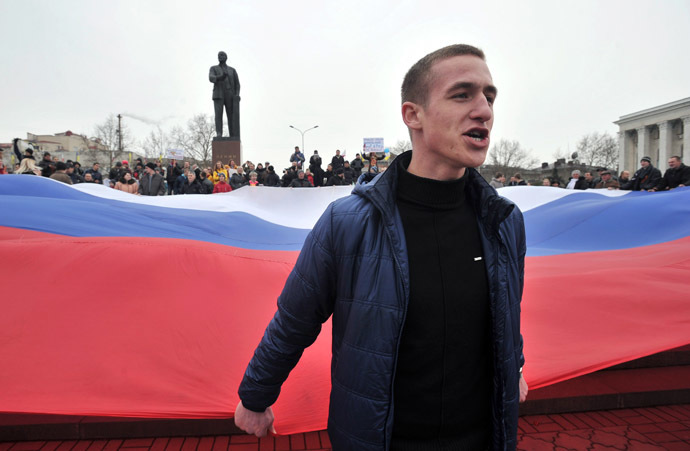
RT:Aren’t you concerned about being isolated?
SA: Der Spiegel asked me the same question. I replied, "But what are the grounds for isolation?" Did we insult our Western partners? We took our own decision. We do not comment on petitions being signed in favor of some states seceding from the US, for instance. That's their domestic affair. So why impose anything on us? If most Crimeans make up their mind, why should anyone tell us to change it? If the West does accept the idea that the policy of a country is determined by its citizens, we will have no differences with the West or anyone else.
RT:One final question. Almost every Western media outlet describes the present situation in Crimea as an ‘invasion’. Has Russia invaded Crimea?
SA: There is no intervention whatsoever, that's a blatant lie. There are clearly attempts to distort the real picture. The West has been ignoring the events in Western Ukraine, including the killings, the looting, the violent attacks by the Maidan activists, though even the opposition-run press is all abuzz with such reports. But one Tiger truck in the Crimean streets is enough to yell that Russia has intervened in Crimea. That's a flagrant lie. Come to Crimea and see for yourselves. There is no threat to life, dignity or security. We’ll be happy to receive people from any country – except those who are planning to come here and teach us with weapons.




